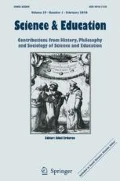Abstract
The theory of dialogism, developed by the Russian linguist Mikhail Bakhtin (1895–1975) with regard to literature and everyday communication, can be used to improve the teaching of science. Some of Bakhtin's conceptual instruments are helpful in analysing the teaching process, and it is interesting to compare them with former ideas about teaching and learning, especially with the points of view of other constructivists. Together with Lev Vygotsky's analysis of thought and language, Bakhtin's dialogism shows how teachers can support students effectively by addressing them as producers of a meaningful picture of the world. The differences between ‘dialogic’ teaching and the well-known ‘Socratic’ method are shown and analysed, as are Bakhtin’s discussions of a ‘carnivalistic’ approach to the students.
Similar content being viewed by others
References
M. Bakhtin (1981) The Dialogic Imagination University of Texas Press Austin, TX
M. Bakhtin (1984a) Problems of Dostoevsky’s Poetics University of Minnesta Press Minneapolis
M. Bakhtin (1984b) Rabelais and His World Indiana University Press Bloomington
J. Bruner (1990) Acts of Meaning Harvard University Press Cambridge, MA
J. Bruner (1996) The Culture of Education Harvard University Press Cambridge, MA
R. Carnap (1961) Der logische Aufbau der Welt Hamburg Meiner
K. Clark M. Holquist (1984) Mikhail Bakhtin Harvard University Press Cambridge, MA
K. Gergen (1994) Realities and Relationship: Soundings in Social Construction Harvard University Press Cambridge, MA
Goethe, J.W.: 1974, Werke, Hamburger Ausgabe, t. 11. München: Beck. Engl. Translation 1962, The Roman Carnival. In: Italian Journey, Pantheon, New York.
F. Kubli (1979) ArticleTitle‘ ȁ8Piaget’s Cognitive Psychology and its Consequences for the Teaching of Science’ European Journal of Science Education 1 5–20
F. Kubli (1983) ArticleTitle‘ ȁ8Piaget’s, Clinical Experiments – its Critique and its Consequences for the Didactic of Natural Science’ European Journal of Science Education 5 123–139
F. Kubli (1992) ArticleTitle‘ ȁ8Un entretien avec Louis de Broglie’ (29 Novembre 1968) Annales de la Fondation Louis de Broglie 17 111–134
Kubli, F.: 1998, ‘ ȁ8Plädoyer für Erzählungen im Physikunterricht – Geschichte und Geschichten als Verstehenshilfen’ (Plea for Stories in Science Teaching.) Aulis, Cologne.
F. Kubli (1999) ArticleTitle‘ ȁ8Historical Aspects in Physics Teaching: Using Galileo’s Work in a New Swiss Project’ Science and Education 8 137–150
F. Kubli (2001a) ArticleTitle‘ ȁ8Can the Theory of Narratives Help Science Teachers be Better Storytellers?’ Science and Education 10 595–599
F. Kubli (2001) ArticleTitleGalileo’s ‘ ȁ8Jumping-Hill’ Experiment in the Classroom – A Constructivist’s Analysis’ Science and Education 10 145–148
Kubli, F.: in press, Geschichten als Türöffner im mathematisch-naturwissenschaftlichen Unterricht. (Stories as Door-Openers in Science Teaching). Aulis, Cologne.
J. Leach P. Scott (2003) ArticleTitle‘ ȁ8Individual and Sociocultural Views of Learning in Science Education’ Science and Education 12 91–113 Occurrence Handle10.1023/A:1022665519862
M. Matthews (1994) Science Teaching Routledge London.
M. Matthews (Eds) (1998) Constructivism in Science Education Kluwer Dordrecht
J. Piaget (1926) The Language and Thought of the Child Harcourt, Brace New York
J. Solomon (2002) ArticleTitle‘ ȁ8Science Stories and Science Texts: What Can They do for Our Students?’ Studies in Science Education 37 85–106
V.N. Voloshinov (1976) ‘ ȁ8Discourse in Life and Discourse in Art’, in Freudianism. A Marxist Critique Academic Press New York
V.N. Voloshinov (1986) Marxism and the Philosophy of Language Harvard University Press Cambridge, MA
L.S. Vygotsky (1962) Thought and Language M.I.T. Press Cambridge, MA
K. Wales (2001) A Dictionary of Stylistics Pearson Education Limited Harlow
J. Wertsch (1985) Vygotsky and the Social Formation of Mind Harvard University Press Cambridge, MA
J. Wertsch (1991) Voices of the Mind Harvard University Press Cambridge, MA
J. Wertsch (1998) Mind as Action Oxford University Press Oxford
D. Wood J. Bruner G. Ross (1976) ArticleTitle‘ ȁ8The Role of Tutoring in Problem Solving’ Journal of Child Psychology and Psychiatry 17 89–100
Author information
Authors and Affiliations
Corresponding author
Rights and permissions
About this article
Cite this article
Kubli, F. Science Teaching as a Dialogue – Bakhtin, Vygotsky and some Applications in the Classroom. Sci Educ 14, 501–534 (2005). https://doi.org/10.1007/s11191-004-8046-7
Issue Date:
DOI: https://doi.org/10.1007/s11191-004-8046-7




